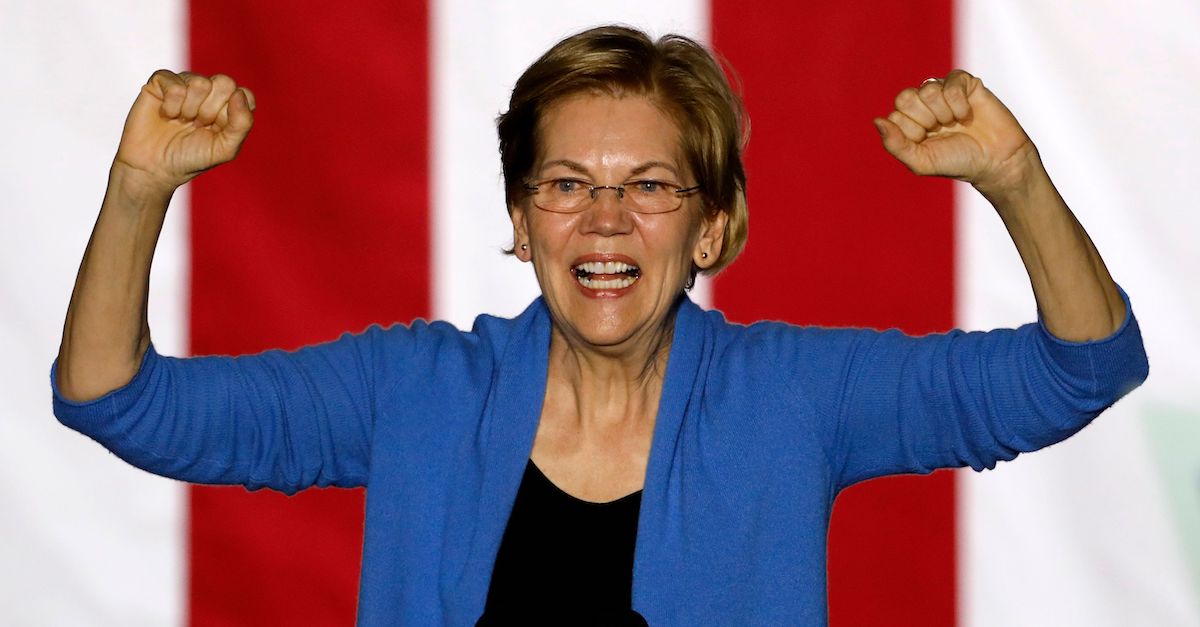
Sens. Elizabeth Warren (D-Mass.) and Sheldon Whitehouse (D-R.I.) on Wednesday asked Treasury Secretary Janet Yellen to investigate the role nonprofit organizations played in the Jan. 6 siege on the U.S. Capitol Complex which disrupted the Senate’s confirmation of Joe Biden as president.
“[T]he IRS’s regulation and enforcement related to 501(c)(4) organizations has been woefully inadequate in the post-Citizens United era,” a letter to Yellen reads. “We urge you to undertake a careful review of what the IRS has done, reform its approach, and rein in abuse by ‘dark money’ organizations.”
The underlying Warren and Whitehouse argument is that the regulatory agencies tasked with enforcing disclosure requirements left in place by the Supreme Court’s 2010 Citizens United decision.
In Citizens United, the Supreme Court struck down limits on campaign spending but left in place disclosure requirements. The opinion states (some internal punctuation and citations omitted):
With the advent of the Internet, prompt disclosure of expenditures can provide shareholders and citizens with the information needed to hold corporations and elected officials accountable for their positions and supporters. Shareholders can determine whether their corporation’s political speech advances the corporation’s interest in making profits, and citizens can see whether elected officials are “in the pocket” of so-called moneyed interests. The First Amendment protects political speech; and disclosure permits citizens and shareholders to react to the speech of corporate entities in a proper way. This transparency enables the electorate to make informed decisions and give proper weight to different speakers and messages.
Warren and Whitehouse rubbished those words of Justice Anthony Kennedy.
That presumption utterly failed: following Citizens United, “effective disclosure” collapsed. This collapse among non-profit groups took place largely because of ambiguous and permissive Treasury regulation of political spending. Corporate special interests, and their sophisticated political operatives, lawyers, and contributors, identified and exploited the IRS’s weak and outdated regulations. They funneled money into organizations under section 501(c)(4) of the Internal Revenue Code precisely because these organizations do not have to publicly disclose their contributors, and then turned those organizations to political work.
“Once Citizens United allowed unlimited political spending in elections, the value of hiding donors’ identities exploded, and political activity by 501(c)(4) groups exploded in parallel,” the letter continues. “Since 2010, 501(c)(4) organizations have spent over $900 million on political expenditures, compared to $103 million in the previous decade.”
“Our most powerful political forces now hide from open debate and public accountability by virtue of having interposed a one-way mirror between themselves and the public sphere,” the letter goes on to allege. It refers to the “result” of Citizens United‘s “seismic shift in the political ecosystem” as a “tsunami of slime” — borrowing the latter term from a New York Magazine article.
Warren, et al. argue that the IRS has “wrongly” shied away from enforcing treasury regulations which are supposed limit the campaign spending of “social welfare” 501(c)(4) nonprofits. Per the letter:
The IRS permits 501(c)(4)s to engage in express political activity as long as it is less than half of the organization’s spending. The remainder of that spending can be on “issue ads” or transfers to other organizations that then spend the money on political ads. In some cases, 501(c)(4) organizations have operated in a manner indistinguishable from Political Action Committees, and some operatives and contributors have created intricate webs of organizations to further thwart disclosure and shield contributors from scrutiny.
Reform efforts have been stymied, the letter asserts.
Generally, according to the IRS, 501(c)(4) organizations are incorporated to undertake projects such managing airports, improving residential parking spots, “sponsor[ing] a community sports league,” providing “holiday programs and meetings,” holding community festivals, encouraging architecture preservation, and the like.
The Warren/Whitehouse letter speaks of proposed legislative fixes and seeks increased IRS enforcement. But it also attempts to connect 501(c)(4) organizations to the Jan. 6 siege on the U.S. Capitol Complex.
“Most immediately, Treasury should work with the Department of Justice and other law enforcement agencies investigating the attack on the United States Capitol on January 6, 2021,” the letter says. “According to reports, a number of dark money organizations helped organize and fund the rally that eventually led to the armed attack on the Capitol. Treasury and the IRS should provide any assistance necessary to help law enforcement in its investigations into the groups behind this tragic assault on our democracy, and should review whether organizers of the assault should keep their tax-exempt status.”
Last month, incoming Senate Finance Committee Chair Ron Wyden (D-Ore.) similarly urged the IRS to probe the use of nonprofits to funnel money into the D.C. riots.
Wyden recently welcomed Warren to the Senate Finance Committee.
Read Warren’s letter below:
2021.02.03 Letter to Sec. Yellen Re. IRS Investigation of Dark Money Non-profits by Law&Crime on Scribd
[Photo by JEFF KOWALSKY/AFP via Getty Images]